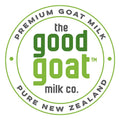Nutritional Facts About Goat Milk

As consumers become more health-minded, they’re paying increasingly more attention to the ingredient and nutritional facts of the products they purchase—and put in their bodies. Thanks to organized educational efforts and mandatory nutritional food labels, this has become easier for consumers. Goat milk has well established nutritional and health benefits and any online search will turn up a number of reports and articles attesting to its advantages. However, a lot of that information lacks context and doesn’t put the data into perspective.
Think about it like this: the word “nutritious” just means that a food—in this case, goat milk—contains and provides nutrients, such as carbohydrates, fats, vitamins, protein, etc. The body needs these substances for maintenance and growth; but all foods contain some degree of these important things. The implication then is that any food that supplies nutrients is nutritious, which most of us know just isn’t true.
A food label alone lacks context. People struggle to balance the nutrients they get from food each day, but they seldom know much about what each of those nutrients actually does for them. Because we believe in the goodness and health benefits of goat milk, we want to provide that context and some perspective on what goat milk can do for you.
What nutritious really means
In most cases, when someone asks whether something is nutritious, they’re really asking if the food promotes good health. First, let’s take a look at some of the nutrients in goat milk; and for added context, we’ll also look at the nutrients in cow milk.

If we’re just looking at the above, it’s easy to tell that goat and cow milk have fairly similar nutrient compositions; however, goat milk provides a better source for all of the above. So what? What you really want to know is what each of those nutrients is good for, and why that makes goat milk nutritious (healthy).
Protein
Proteins consist of amino acids and are essential and because the body can’t manufacture them, it’s up to you to ensure your diet supplies them. Remember, not all proteins are created equal but in general, protein derived from our diet is vital for almost every component of every cell in our body. Protein is used by the body to build and repair tissues, create enzymes, hormones, and other vital body chemicals. At its core, protein provides the necessary building blocks for our muscles, bones, cartilage, skin, and blood.
Protein is also considered a macro-nutrient—nutrients the body requires in significant amounts to keep us healthy. In goat milk, the A2 protein variant is part of what allows it to be digested more easily than cow milk.
Energy
The energy density of food is just as important. This is the amount of energy any given food contains per gram. We need energy for maintenance and growth; it keeps us warm and active as well. The energy provided by food is typically provided by the protein, fat, and carbohydrate content.
Calcium, iron, potassium, and magnesium
Calcium, iron, potassium, and magnesium are all minerals. Minerals give our bodies what they need to function and develop. For starters, calcium is stored almost exclusively in our bones and teeth, which is what keeps them strong. Your muscles and blood vessels depend on calcium to contract and expand, and to help release enzymes and hormones that impacts nearly every function of the body as well.
Iron is responsible for transporting oxygen from the lungs to the tissues, and provides oxygen to the muscles, too. Cell growth, normal body functions, and the body’s development are maintained by iron.
Your muscles, nerves, and cells all depend on potassium to maintain normal function. It also helps your body to regulate blood pressure, water content in cells, and your heart’s rhythm. Lastly is magnesium. This mineral helps regulate muscle and nerve function, as well as blood sugar levels and blood pressure.
Vitamins B-6 and C
Vitamins are another group of compounds similar to minerals that the body depends on to stay healthy. Vitamin B-6 is vital to key metabolic processes, helps support healthy adrenal function, and calms/maintains your nervous system. Vitamin C acts as an antioxidant and protects cells from damage (caused by free radicals—compounds formed during the process of converting food into energy). Vitamin C can also help repair and regenerate tissues and protect against heart disease, along with helping the body absorb much-needed iron.
Other nutritious benefits of goat milk
Aside from the bounty of minerals, nutrients, and vitamins that goat milk offers, its nutritional benefits don’t end there. One of the primary advantages of goat milk is that its chemical composition is far closer to human milk than cow milk is, which means our bodies can absorb and process more of the milk’s nutrients (compared to cow milk), and it taxes our digestive system far less.
Goat milk features smaller fat globule size, meaning it can be more rapidly digested; and, it’s naturally homogenized, increasing the ease with which your body digests it. This occurs due to its lipids forming a thinner emulsion that doesn’t cluster, increasing its surface area so that the fat digesting enzymes, lipase, can do their job.
We hope you’ve learned a bit more about the relevance of nutrition labels, and about the added health benefits of choosing goat milk. When in doubt, always check the nutrition label and make use of the vast information concerning food safety and nutrition to educate yourself—and keep your body healthy and happy!
